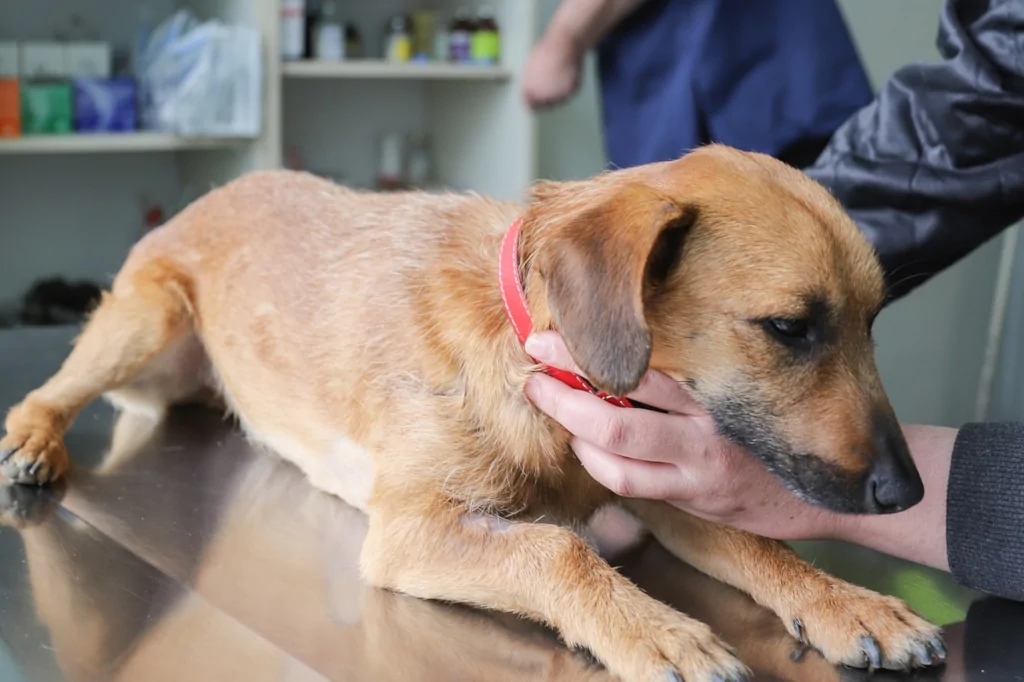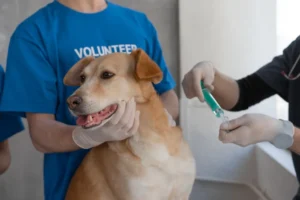Bringing a new puppy into your life is an exciting and heartwarming experience, but as a pet owner, you also have the responsibility of keeping your furry friend healthy and safe.
One of the key aspects of your puppy’s health is making sure they receive the proper vaccinations on time.
We’ve all felt the anxiety of trying to keep track of vaccination schedules and booster shots, especially when there’s so much conflicting information out there.
But don’t worry, we’ve got you covered. In this article, we’ll be exploring the essentials of what you need to know about puppy vaccinations, so you can confidently protect your pup and ensure they grow into a healthy, happy adult dog.

Why Are Puppy Vaccinations Crucial?
Puppy vaccinations play a vital role in safeguarding your pet from various life-threatening diseases.
Puppies are born with some immunity from their mother’s milk, but this protection gradually fades as they grow. Vaccinations help bridge that gap and stimulate your puppy’s immune system to produce antibodies against harmful pathogens.
This not only ensures your dog’s well-being but also prevents the spread of diseases among other pets and even humans.
So, as a responsible pet owner, timely vaccinations are not only essential for your furry companion but also contribute to the overall health of our pet-loving community.
The Recommended Vaccination Schedule for Puppies
Navigating the world of puppy vaccinations can be overwhelming, but we’re here to make it simple and straightforward for you. To ensure your puppy stays healthy and protected, follow this recommended vaccination schedule.
Initial Vaccines
The first round of vaccines is usually given when puppies are around 6 to 8 weeks old. Here’s a breakdown of the core vaccines and their recommended schedule:
- Distemper, Parvovirus, and Adenovirus. These three vaccines are typically combined into a single shot called the DAPP or DA2PP vaccine. They are administered in a series of three or four doses, given every 3 to 4 weeks, starting at 6 to 8 weeks of age.
- Rabies. Rabies vaccination is legally required in most places and is usually given at 12 to 16 weeks of age. A booster shot is then given one year later.
Non-core vaccines, such as Bordetella, Leptospirosis, Lyme, and Canine Influenza, may be recommended depending on your location, lifestyle, and your dog’s risk of exposure. Consult your veterinarian to determine which non-core vaccines are appropriate for your puppy.
Booster Shots
Booster shots are essential to maintain your dog’s immunity throughout their life. After the initial series of vaccinations, adult dogs need booster shots as follows:
- DAPP or DA2PP. DAPP stands for Distemper, Adenovirus, Parainfluenza, and Parvovirus, which are four common diseases that the vaccine protects against. A booster shot should be given one year after the last dose of the initial series, followed by additional boosters every 3 years.
- Rabies. Depending on local regulations and the specific vaccine used, rabies boosters are given either annually or every 3 years.
I remember when I took Charlie, my younger dog, for his first round of vaccinations. He was so nervous at the vet’s office, but the staff was incredibly patient and reassuring. They explained the importance of each vaccine and helped Charlie feel at ease throughout the process.
That experience really highlighted the importance of finding a trusted veterinarian who can guide you through the vaccination journey.
Try to follow the recommended vaccination schedule, but consult with your veterinarian to ensure your puppy gets the best protection from diseases. Always rely on your vet’s expertise to tailor the vaccination plan to your dog’s specific needs.
How to Keep Track of Your Puppy’s Vaccinations
Staying organized with your puppy’s vaccination records can be a breeze with the right approach.
To stay organized, create a physical or digital record that includes the dates, vaccine types, and any reactions your puppy may have experienced.
You can use a dedicated pet health app, a calendar, or a simple spreadsheet. Make sure to update this record after each vet visit, and set reminders for upcoming vaccinations to ensure you never miss a crucial appointment.
When I first brought Sam home, my older dog, I decided to use a digital pet health app to keep track of his vaccinations. I found that the app “PetDesk” was a lifesaver. With features like appointment reminders and the ability to store vaccination records, it made managing Sam’s health care a stress-free experience.
By using a dedicated app, you’ll have all your puppy’s vital information at your fingertips, making it easy to stay on top of their vaccination schedule and other health-related appointments.
The Importance of Staying on Schedule
Adhering to the vaccination schedule is vital for maintaining your puppy’s immunity and protecting them from serious illnesses.
Delaying or missing vaccinations can leave your puppy vulnerable to diseases and may result in the need for additional booster shots to re-establish immunity.
Furthermore, staying on schedule helps prevent the spread of diseases among other animals and contributes to the overall health of your pet community.
FAQs
Alex, a passionate animal lover, has experience in training and understanding animal behavior. As a proud pet parent to two dogs and three cats, he founded AnimalReport.net to share insights from animal experts and expand his knowledge of the animal kingdom.




